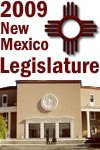The New Mexico Legislature makes a quantum leap forward with webcasting and open conference committees
In 2006, the Legislature intentionally didn’t appropriate $75 million for water-rights settlements. House Speaker Ben Lujan didn’t like that, so he quietly slipped the funding into the capital outlay bill when no one was watching.
Exactly when in the process Lujan did that has never been entirely clear, but this much is apparent: The speaker took advantage of his power and a system that allowed such acts to go undetected to bypass the legislative process and make himself the sole decider of how to spend $75 million in taxpayer money.
Fortunately, the governor vetoed the funding, but the point remains this: The system should have been set up so that Lujan, D-Nambé, could never abuse his authority in such an egregious manner.
The Legislature has taken two important steps toward increasing transparency and changing its own culture this session — steps that will make it more difficult for Lujan or any other ethically challenged lawmaker to abuse power in that manner in the future.
The webcasting revolution
The first — webcasting — was forced on the Legislature by Rep. Janice Arnold-Jones. Frustrated by the unwillingness of legislative leaders to begin webcasting live audio and video of legislative proceedings, Arnold-Jones, R-Albuquerque, showed up in Santa Fe at the start of the session with a webcam hooked up to her laptop and began webcasting from her committee meetings.
She came very close to violating House rules in doing so, but public attention on the issue made it nearly impossible for anyone to try to stop her. Forced to deal with the issue, the House quickly approved its own, official audio webcast from the House floor.
The movement snowballed from there, with other Republican House members and some media outlets following Arnold-Jones’ lead and webcasting legislative proceedings. Most talked-about, behind the Arnold-Jones webcasts, were live audio and video webcasts of ethics-reform hearings in the Senate Rules Committee by the New Mexico Independent.
Shown that they also could no longer delay webcasting, Senate leaders who had spent years fighting the will of the majority of their chamber’s members gave in an approved official audio and video webcasting from the Senate floor.
The House webcast doesn’t include video. The Senate’s isn’t much better, because the video comes from one camera in the back of the room that shows the hind sides of only nine of 42 senators.
But what they did approve is a quantum leap forward for a Legislature that has been accustomed to operating, in such a vast and poor state, without most citizens understanding how they do business because of the logistical difficulties many have in traveling to Santa Fe to participate.
Opening conference committees
I wrote earlier in the session that webcasting would change Santa Fe’s culture, and it has already had an impact. The webcasting has been a frequent topic among lawmakers. And anyone who wants has been able to watch the Senate Rules Committee stonewall ethics reform this session, which put pressure on the committee — and the Senate as a whole — to act.
Perhaps most notable was Thursday’s debate in the Senate on the proposal to open conference committees and other legislative meetings to the public. I’ve watched the debate on this proposal in the past, and the tone was different this time. Opponents had an air of resignation about them, as if they knew they were making their last stand.
And they were. The vote wasn’t even close. After killing the proposal every time it’s come before them in the past, senators voted 33-8 in favor of opening the meetings at which senators and representatives reconcile differences between versions of bills that have passed both chambers. An impressively bipartisan group voted for the proposal, which had already passed the House. The governor has pledged to sign the bill, sponsored by Rep. Joseph Cervantes, D-Las Cruces.
One big factor in the Senate’s change of heart was the replacing in last year’s election of five opponents of open conference committees with senators who voted on Thursday for the proposal. In addition, several other senators who had previously voted against the proposal switched sides this time.
They understand what’s happening. The sun is shining in.
Greater transparency
In addition to opening conference committees, the bill is significant because it opens most other legislative meetings at which decisions are made. Executive sessions of the House and Senate budget committees are among those the bill opens to the public.
Which makes it more difficult to slip appropriations into funding bills undetected.
And that brings me back to Lujan. The potential for abuse of power — like the speaker’s egregious act in 2006 — continues to exist unless every step in the legislative process is public. Changes the Legislature has made this year ensure that people have easier access to the proceedings on the House and Senate floor and that, for the first time, the public gets access to conference committees and other meetings that have always been secret.
Sure, as some critics of opening conference committees have said, the increased transparency will just chase some of the deliberations further underground. But it will also increase public awareness of what the Legislature is doing and how it’s doing it. And it will, for the first time, shine light on decisions that are made in conference committees.
Though the darkness will continue to exist, I say it’s better to push the darkness to the fringes than it is to embrace it.

